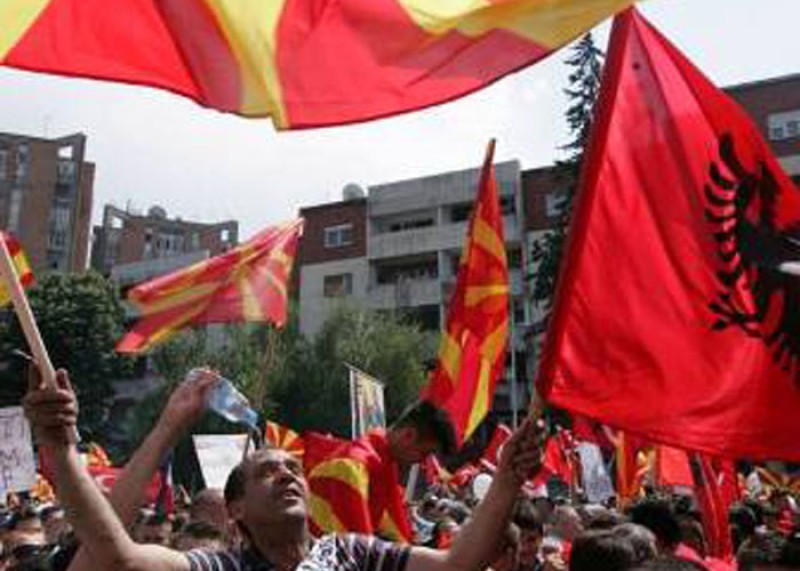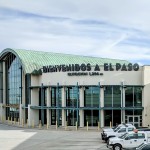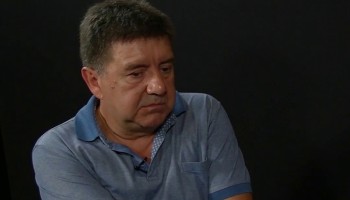Protestors are camping out here, vowing not to go home until Prime Minister Gruevski steps down and new, fair, democratic elections can take place.
Ten minutes' walk away, in front of Skopje's Parliament, a smaller group of people gather in their own camp. They play ethnic Macedonian music from their radios.
They say that they, too, will camp out until the leader of the opposition, Zoran Zaev – Prime Minister Gruevski's arch rival – resigns.
Fast-forward two weeks, and neither camp has gotten what it wants.
This week Gruevski agreed to snap elections to take place by next April. But key questions still remain, such as who will rule in the transitional period until the polls.
As a fragile resolution hangs in the balance, OCCRP takes a look at how Skopje got here. 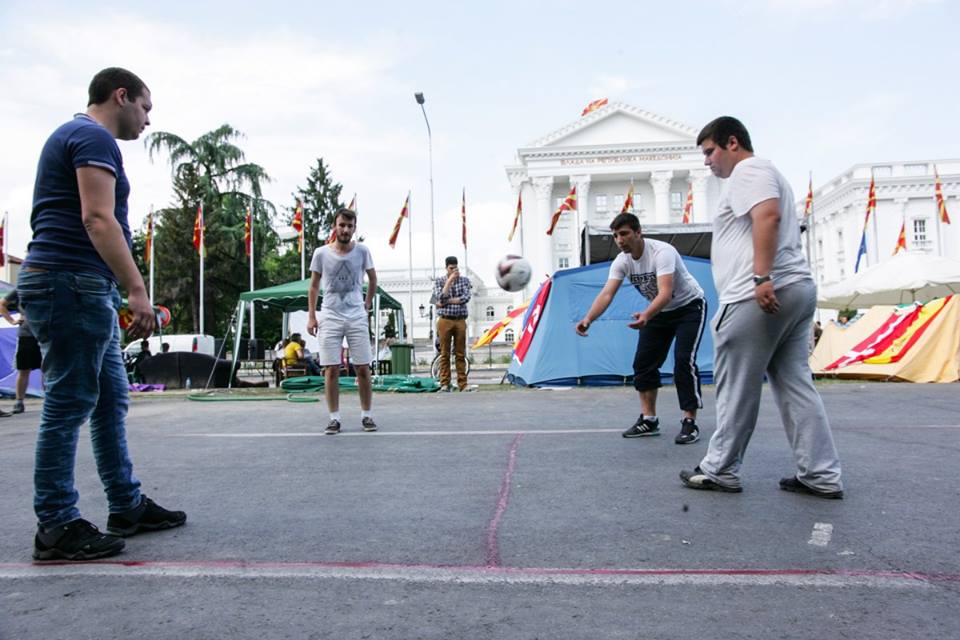 Anti-government camp, photo by Bozidar Barlakoski
Anti-government camp, photo by Bozidar Barlakoski
Growing discontent
Since February, Zaev has been publishing an incendiary series of recordings – one or two a week – which appear to implicate Gruevski's cabinet in serious offenses.
However, according to civil activists and members of the Skopje student assemblies, the tapes only added wind in the sails of a ship that had been clipping along for months.
"[Zaev's party, the SDSM] did this in order to monopolize what has been done by citizens and activists by now," says Artan Sadiku, program director of the Macedonian Institute for Social Sciences and Humanities. Sadiku is also an activist from the leftist citizens organization "Solidarnost".
"Some people said we cannot go against Gruevski by ourselves," Sadiku continued, "but what I don't understand is why the opposition never supported any protests before." Since the beginning of this year, he said, "not a week went by without some protest."
Dissatisfaction among academic and labor rights groups came to a head last October when Macedonian Education Minister Abdilaqim Ademi announced education reforms including the introduction of a "state exam".
Passing this exam would be mandatory for all students in both private and public universities, not once but twice – first after completing their second year, and once more at the end of studies.
Ademi said any student who failed the second-year state exam would "know he can't move on" and would "not spend any more time or money" on his studies – which civil rights activists took to mean that the government would now be able to root out and block students they considered undesirable.
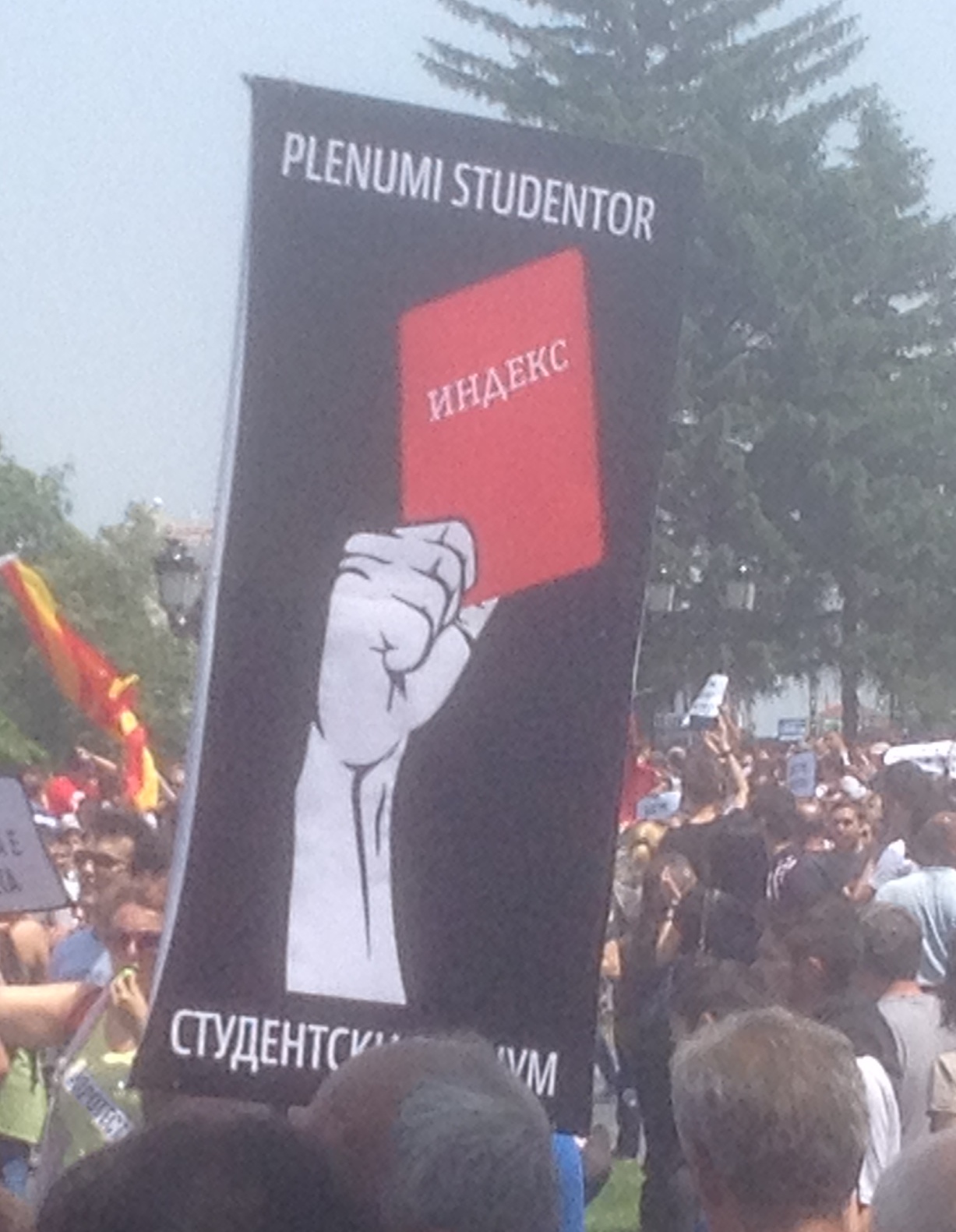 Student Plenum Both the student community and most professors rejected the reforms. They called the proposed law unconstitutional, and said it took autonomy away from educational institutions. By mid-November, more than 2,000 students gathered for a protest march in Skopje.
Student Plenum Both the student community and most professors rejected the reforms. They called the proposed law unconstitutional, and said it took autonomy away from educational institutions. By mid-November, more than 2,000 students gathered for a protest march in Skopje.
Smaller demonstrations erupted in the cities of Stip and Bitola and support grew. On Dec. 10, more than 12,000 students protested the proposed law, according to Balkan Insight.
Although neither Zaev nor his opposition party was involved at first, government-friendly media such as Kurir.mk reported the students and professors had been backed by the SDSM.
Regardless, the students' demands were ignored, and the state exam law was adopted on Jan. 14, 2015. That night, students and professors gathered in front of Parliament to lay flowers at a symbolic funeral for higher education.
In February, philosophy students at Skopje University declared an "autonomous zone" in which they slept, ate and held self-organized alternative lectures – a practice which quickly spread out to other universities across the country.
Finally, after 15 days of occupation by students during which no formal education occurred, the government agreed to hold off on the law for a year.
During this time, students would be invited to help devise a new law, said the authorities.
"This was a huge victory for everyone," says Gorgi Pulevski, a member of the Macedonian student assembly; it showed that Macedonia can fight for modernization and democratization.
Gruevski's government proposed another law targeting a separate constituency – freelancers and part-time workers. It would require self-employed and part-time workers to contribute to the state and health funds, in effect increasing their income tax by 35 percent.
Macedonia's unemployment rate hit 27 percent in 2014, so part-time and freelance work is a key source of income for many. Rubbing salt in the wound was the fact that elected and appointed public officials would be exempt from the new tax. Protestors believed it was introduced to weaken non-governmental organizations and independent media outlets, which rely heavily on part-time workers and freelancers.
Despite yet another protest in Skopje attended by thousands on Dec. 22, 2014, the new law took effect on Jan. 1.
The catalyst
As anger grew in the final months of 2014, Zoran Zaev – leader of the SDSM – said he had evidence of illegal actions by the ruling party. 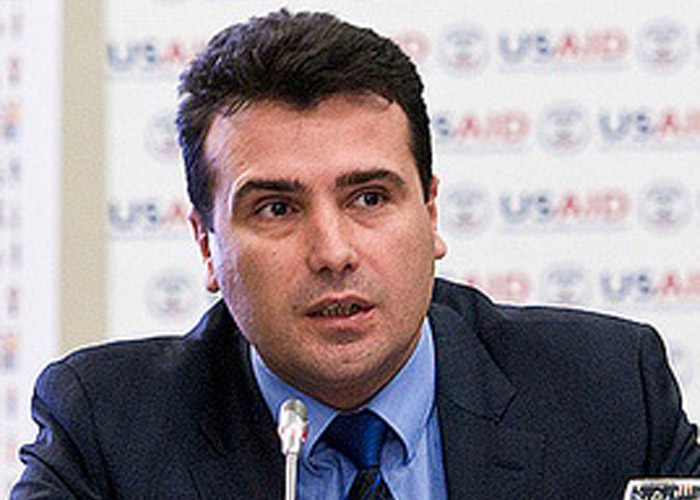 Zoran Zaev
Zoran Zaev
On Jan. 31, Zaev was charged with"endangerment of the constitutional order, and an attempt at undemocratic seizure of power for the first time after Macedonia's independence".
Gruevski accused Zaev of trying to blackmail him into calling snap elections.
Three more people were taken into custody – former Macedonian secret service director, Zoran Verusevski; his wife, Sonja Varusevski; and Branko Palifrov, an official from the eastern municipality of Strumica. Zaev was not detained, but was forced to turn in his passport.
Undeterred, Zaev released his first tapes at a crowded press conference in February.
He said that Gruevski and his cousin, then-chief of the Secret Police Saso Mijalkov, had conspired to illegally wiretap more than 20,000 Macedonian citizens, including politicians, NGO activists, journalists, businessmen and even Gruevski's own cabinet members.
In a country of only two million, that would mean the government had bugged one in 100 of its people.
Two or three recordings were played at each of the subsequent 35 SDSM media sessions – and Zaev said he still had more.
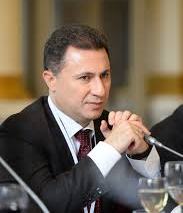 Nikola Gruevski Several of Gruevski's cabinet members were compromised by the recordings. Their voices were heard discussing efforts to influence the judiciary, nepotism, electoral fraud, abuse of power, illegal government spending, politically motivated arrests and covering up the government's role in the murder of a young man by a policeman.
Nikola Gruevski Several of Gruevski's cabinet members were compromised by the recordings. Their voices were heard discussing efforts to influence the judiciary, nepotism, electoral fraud, abuse of power, illegal government spending, politically motivated arrests and covering up the government's role in the murder of a young man by a policeman.
One recording allegedly revealed that the arrest of former Minister of Internal Affairs Ljube Boskoski, a one-time political ally of Gruevski and former VRMO-DPMNE member, was politically driven.
That conversation appeared to feature Gruevski, Mijalkov, Interior Minister Gordana Jankulovska and cabinet chief Martin Protuger saying that they would arrest Boskoski, tell the media how to report the event, and then arrange for a person called "Johan" to rape him in jail.
On top of that, conversations that appeared to take place between Gruevski, Jankulovska, and Transport Minister Mile Janakieski discussing how they committed fraud in the 2013 elections.
According to another tape released by Zaev, the VMRO-DPMNE allegedly bussed people from the Prespa region in Albania, swiftly issued them with ID cards, put them into state-owned apartments in Skopje, and had them escorted to polling stations on election day.
Jankulovska's voice is heard saying that 50 people were crammed into an apartment 40 meters square.
The recording appeared to confirm the results of an investigation by OCCRP partner NovaTV published about a month after those elections in 2013. Journalists interviewed voters in the Center municipality in Skopje on polling day, finding that many could not name the street they claimed to live on.
Some seemed barely to understand Macedonian. NovaTV also recorded one of them stepping into a car owned by the brother of a prominent VMRO-DPMNE party member.
Some recordings purporting to feature conversations between Gruevski and Janakieski also implicate the Prime Minister in property fraud. In one, Gruevski refers to a large plot of land in an exclusive neighborhood in Skopje, and discusses illegally manipulating city zoning regulations to make a profit from it.
OnApril 28, Zaev published his list of the 20,000 people whose conversations had allegedly been monitored by the government – a huge roster that included his own name.
The same day, he announced plans for the May 17 protest – a demonstration he intended to use to dislodge the ruling party from power.
But protests erupted about two weeks earlier than he planned, on May 5. 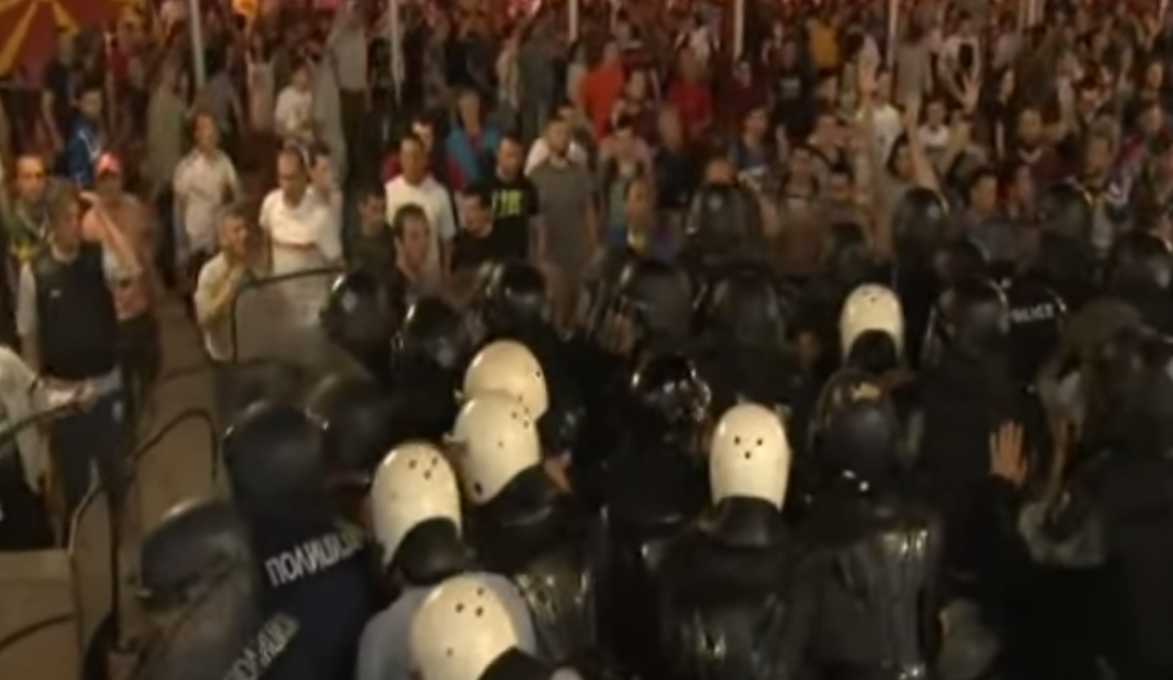 May 5, protesters clash with police
May 5, protesters clash with police
About 2,000 people marched on the capital, clashing with police in front of the government building. Protesters threw stones and cabbages, and set trash cans ablaze.
"The violence came suddenly at the end, when people were about to go home, " says 27-year-old Adrian Bozinov, who was one of the protesters. "A group of football hooligans started to throw bottles at police."
The same day, Zaev published recorded conversations between Mijalkov, Jankulovska, Protuger, and Interior Ministry spokesperson Ivo Kotevski, which appeared to show that members of the government had colluded in an attempt to protect the murderer of 21-year-old Martin Neskovki.
Nepotism was one thing, but murder cover-ups were another. It felt like the last straw for protestors. As a result, they focused their attention on the issue of police brutality at a protest the next day.
Yet another tape was then released. It focused on a probe into the 2013 death of prominent government critic Nikola Mladenov. The released material indicated the government had withheld information from the public regarding the fatal car collision that killed Mladenov – an apparent accident regarded by some as suspicious.
Support for the protests grew. Although they had assembled independently of Zaev's plans, members of the SDSM felt his work had been the catalyst.
Radmila Sekerinska, vice president of the SDSM and former Deputy Prime Minister of European Integration, concedes that civil unrest "did not start yesterday, nor did it start three months ago when we started to publish these recordings."
She says, however, that the movement rapidly gained momentum under the SDSM's initiative.
"Now citizens could see not only what is apparent, but also what is happening behind closed doors. When they recognized how unimportant they are to the government, it made them very angry," says Sekerinska.
Meanwhile, Gruevski denied wrongdoing, claiming that the tapes were "created, glued and assembled" by the opposition.
Bloodshed
The same weekend, on May 9, events took a disturbing turn.
According to the Ministry of Interior, Macedonian authorities believed that a group of terrorists had taken up residence in "a few houses" in the neighborhood of the "Diva Naselba" (Diva Settlement) in the northern Macedonian town of Kumanovo. Police launched a raid on the properties.
The shocking and bloody police operation led to 18 casualties of both police and members of the armed group. It lasted for nearly 16 hoursand resulted in the death of eight police officers and 10 alleged terrorists.
Another 37 police officers were wounded, and 30 alleged insurgents surrendered. Authorities said they seized a large cache of weapons during the raid.
Ministry of Interior spokesperson Ivo Koteski said members of the Kumanovo group wore insignia of the Kosovo Liberation Army – an ethnic Albanian paramilitary unit which was dismantled by the end of the 1990s.
As questions reverberated in the media, some speculated about the timing of the raid.
Authorities said the operation had dismantled an Albanian separatist terrorist group which they say was planning an attack on state institutions.
Zoran Andonovski, 45, who attended the anti-government protest, has serious doubts that there was a planned terrorist attack – the timing, he felt, was too convenient.
"The events in Kumanovo were instigated by Gruevski because of the current political crisis," he claims.
There is some discussion of such an idea in the recordings. Zaev had published a recording appearing to show a controversial exchange between cabinet chief Protuger and Interior Minister Jankulovska in which Protuger suggests starting a war with the Albanian minority in order to vanquish them once and for all.
Jankulovska appears to respond that, if a war were to occur, the Albanians would be destroyed within an hour. But, she allegedly said, it was not the right time to flex their muscles.
Back in Skopje, in the late hours of May 12, the interior minister, transport minister and the chief of the Secret Police resigned. They had been heavily implicated in the wiretapping tapes; Saso Mijalkov, chief of the Secret Police, had been accused of conspiring with Gruevski to implement the wiretapping operation itself. Gruevski, however, seemed determined to cling to power.
Protests died down. Activists were preparing for May 17 – the day Zaev planned to lead massive anti-government protests, bigger than the impromptu gatherings that came before.
Two worlds a block apart
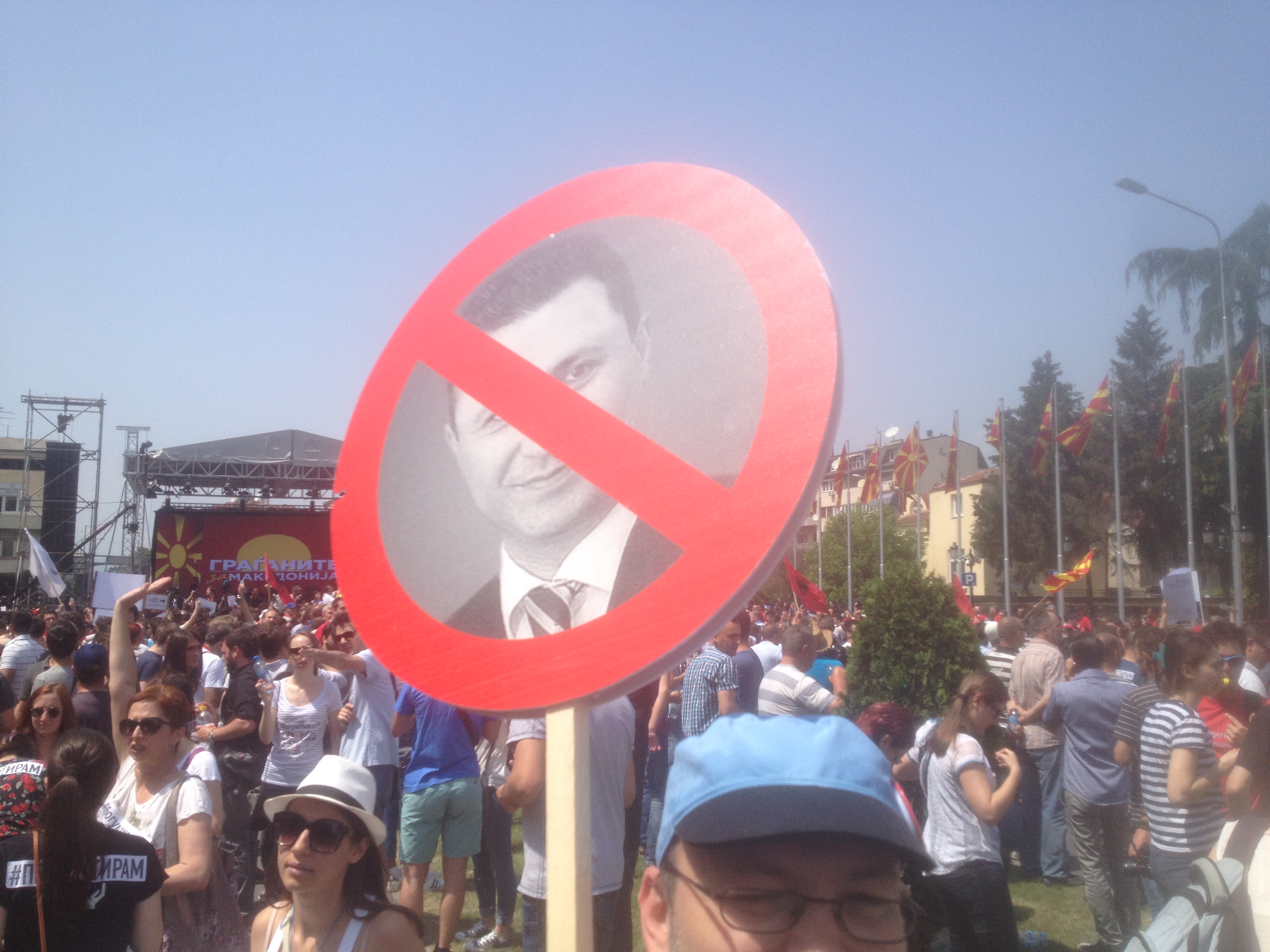
The colors of various Balkan country flagsfilled the streets – mostly those of Macedonia and Albania. Blasting from speakers were regional ethnic tunes, anti-fascism songs from the Yugoslav era, and techno tracks containing excerpts from some of Zaev's published recordings.
Both old and young had gathered, while activists organized stacks of free water bottles.
Many older Albanians wearing traditional hats could be spotted as protesters tried to emphasize Macedonian–Albanian unity after the tragic events in Kumanovo.
Police presence was strong. A group of heavily armed soldiers and a line of armored vehicles could be seen around the government building.
"Macedonia is only a democracy on paper. It is actually a particracy," said 21-year-old law student Edina Zekirovic at the scene. "I'm here because I oppose our government. But I believe that the opposition is not very different from them."
"But what I can say with certainty is that the young people of Macedonia have awakened from their slumber," she added.
Protesters began to disperse in the late afternoon, but some stayed and set up camp in front of the government building.
"We are here because we want to be," says 65-year-old Aleksandar Petrovski," andtomorrow [the VMRO-DPMNE supporters] will gather because they are forced to do so".
He appeared to refer to the people who would attend the pro-Gruevski counter-protest, organized to take place the next day.
Petrovski believed the crowd would be comprised of people linked to the VMRO-DPMNE in some way – either working in government administration or companies close to the government.
"They must come," he alleges, "or they will be fired".
The next evening, about 30,000 people gathered to support the ruling party. The VMRO-DPMNE Prilep city website boasted a video and pictures of rows of buses with party supporters flocking to Skopje to lend their support. 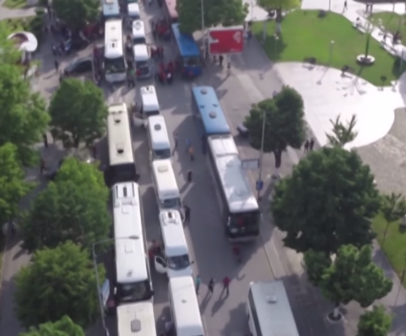 Prilep, buses of VMRO-supporters leaving for Skopje
Prilep, buses of VMRO-supporters leaving for Skopje
A sea of people spread across the street in front of the Parliament building, gathering around a stage. This time, a Macedonian ethno-music band started to play behind a group of dancers dressed in traditional clothing performing a folk dance.
Macedonian flags bearing controversial image of the Vergina Sun – the former flag of Macedonia which was changed after Greek objections, and which is now is percieved as a nationalist symbol – hovered above the masses alongside flags of Serbia.
That day, the protests were not as colorful. Red dominated the air. Large, loud men, some sporting buzz-cuts, raised their cardboard crosses and flags aloft. Albanian flags were conspicuously absent.
Soon, Gruevski appeared on stage to greet the masses and deliver a fiery speech.
He claimed that Zaev had misled the public and was trying to mount a coup against him with the aid of an unnamed foreign secret service.
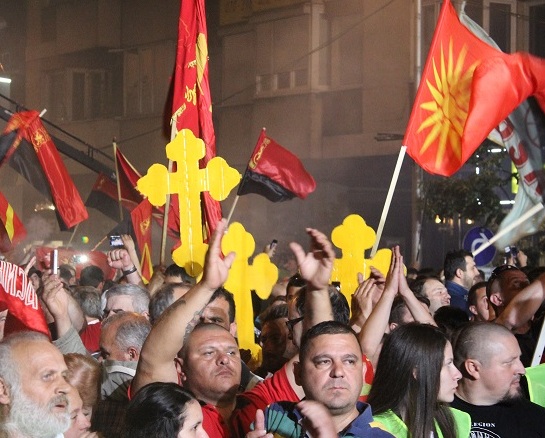 May 18 gathering, photo by NovaTV Zivko Popovski, 55, said he supported the ruling party because they created jobs and were responsible for developing the country. He said the opposition was "skewing the truth in Macedonia" and "sending a false image of the country to the world".
May 18 gathering, photo by NovaTV Zivko Popovski, 55, said he supported the ruling party because they created jobs and were responsible for developing the country. He said the opposition was "skewing the truth in Macedonia" and "sending a false image of the country to the world".
Some of the government supporters decided to follow the example of their rivals, setting up their own camp in front of the Parliament building.
Not all seemed happy to be there – a suggestion hinted at in a recently emerged video in which a VMRO-DPMNE supporting camper appears to admit that he was sitting there on the orders of Gruevski.
"I will stay here until he [the Prime Minister] decides I can go, because the others [in the anti-government camp] are also staying over there on Zaev's orders," the man in the video says.
International attention
Concern from Europe spiked after the Kumanovo tragedy. NATO Secretary General Jens Stoltenberg expressed"great concern" and called for an investigation into the bloodshed.
A joint statement by ambassadors from France, Germany, the UK, the US and the EU voiced both support for the Macedonian people, and concern over a possible escalation in the conflict.
While anti-government protesters promoting inter-ethnic unity had softened tensions on the streets of Skopje, externally the repercussions of the incident continued.
The Albanian government was not happy about the way Macedonian police approached Kumanovo, a town predominantly inhabited by ethnic Albanians.
Macedonia, whose full official name is the Former Yugoslav Republic of Macedonia (FYROM), already has a hard time with EU integration matters as a result of a naming dispute with neighboring Greece – a conflict which goes back to the early 20th century, but was reignited with the breakup of Yugoslavia.
Amid cajoling from the international community, Gruevski and Zaev met European parliamentarians in Strasbourg on May 19, as the European Parliamentinvited them to negotiate an agreement to resolve the political stalemate. They could come to no resolution that day.
Soon, however, repeated negotiations brokered by European politicians would produce some initial results.
A shaky resolution?
After long talks in Skopje on June 2, the European Enlargement Commissioner Johannes Hahn announced that a deal had been made to hold snap elections by April 2016. In the meantime, a transition period could take place, according to the plans. Describing the talks as a success, Hahn said the negotiations were "very constructive".
But inconsistencies and serious questions remain. During the transitional period, will Prime Minister Gruevski step down or not, and if he does, who will be in charge?
Commissioner Hahn has announced another meeting to take place next week in Brussels. He says that these talks should produce "a final agreement which allows the country to head on".
In the meantime, Macedonia hangs in limbo.
By Igor Spaic
